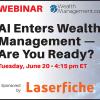Lately, I’ve read quite a few articles about the potential of artificial intelligence to boost the performance of investment portfolios. Well, the pony ridden by AI is off to a bad start in that race.
A June 2 article in Yahoo Finance points out that the AI Powered Equity ETF (AIEQ) has a 1-year return of -13.92%, while the Vanguard Total Stock Market ETF (VTI) is up 2.12%.
A June 10 report by PortfoliosLab shows AIEQ with a 5-year annualized return of 4.10%, compared with a return of 10.98% for the SPDR S&P 500 ETF (SPY).
I’m sure there will be plenty of examples where AI shines and wins the race over some period against some benchmark. Dart-throwing monkeys occasionally beat the market too.
Will AI learn to pick winners consistently? Not likely.
Markets are not subject to immutable laws like the physical universe. There are no constants like the speed of light or the force of gravity.
You can’t discover what makes it tick, no matter how smart you are, because there is no “it.”
Markets are complex adaptive systems that are the product of decisions made by millions of investors, all with slightly different perspectives, needs and constraints that change over time in unpredictable ways. They do not exist in a database. They can’t be learned by a computer program, no matter how powerful.
Consider the difficulty of trying to outthink Mr. Market. We’ve all seen the graphics that show the consequences of missing the 10 best days in the market, but it’s worth a reminder.
The S&P 500 Index returned 8.81% from 2007 through 2022. If you missed the 10 best days in the market, your return was more than cut in half to 3.29%. If you missed the 20 best days, your return was negative. A paltry -.17%. The difference between solid returns and a negative outcome was determined by Mr. Market’s performance on about 0.5% of the trading days.
A paper published in 2018 by Professor Hendrik Bessembinder documented that the best-performing 4% of stocks explain the entire net gain for the stock market between 1926 and 2016. The other 96% of stocks collectively matched the performance of one-month Treasury bills; and most of those lost money. The target to hit to beat Mr. Market is very small indeed.
AI operates by processing massive amounts of data and “learning” from what it consumes. It has no independent ability to predict the future. Where would it find data that would allow it to glean the future prices of stocks? Maybe from the collective wisdom of active managers?
Unfortunately, this is not a very rich milieu for discerning market-beating intelligence. Year after year, the SPIVA Scorecard teaches us this lesson.
That report shows that on average for the last 20 years (2003 to 2022) 65% of all large-cap domestic equity managers have underperformed the S&P 500 Index for the calendar year. For the most recent five-year period, 87% have underperformed. For the most recent 10 years, 91% have underperformed. What is AI to do with the collective wisdom of this crowd?
AI is mind bogglingly powerful and will change our world dramatically over the coming years. Just don’t expect it to win a horse race against Mr. Market over the long term.
Scott MacKillop is CEO of First Ascent Asset Management, a subsidiary of GeoWealth LLC. First Ascent is a TAMP that provides services to financial advisors and their clients on a flat-fee basis. He is an ambassador for the Institute for the Fiduciary Standard and a 47-year veteran of the financial services industry. He can be reached at [email protected].







